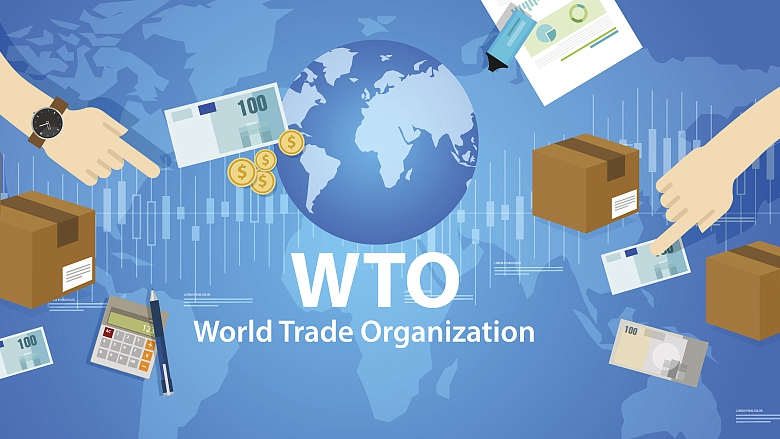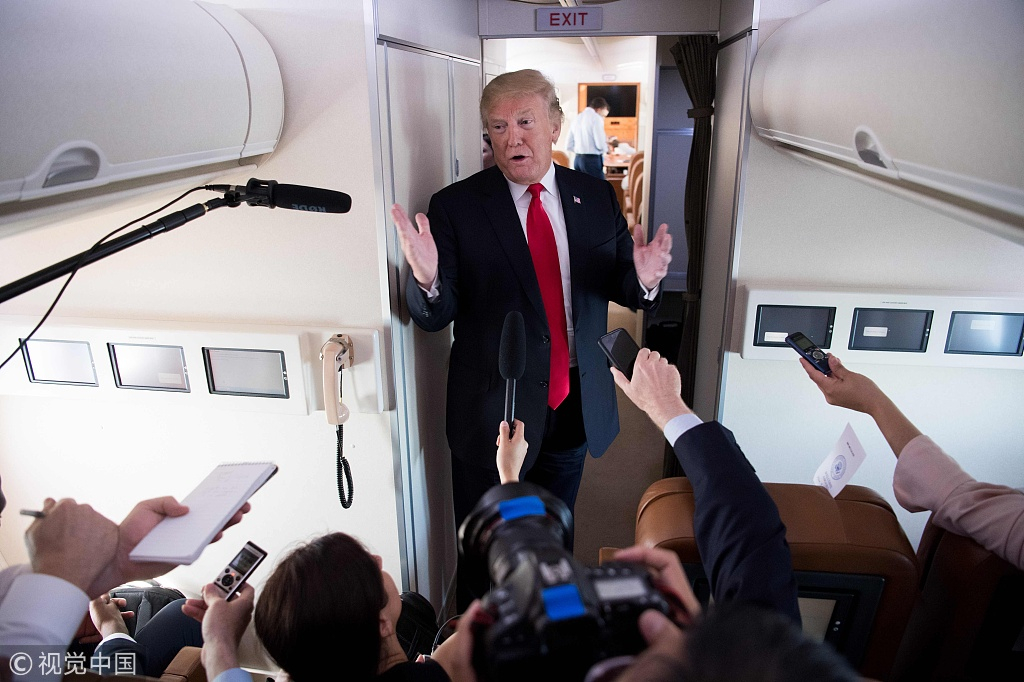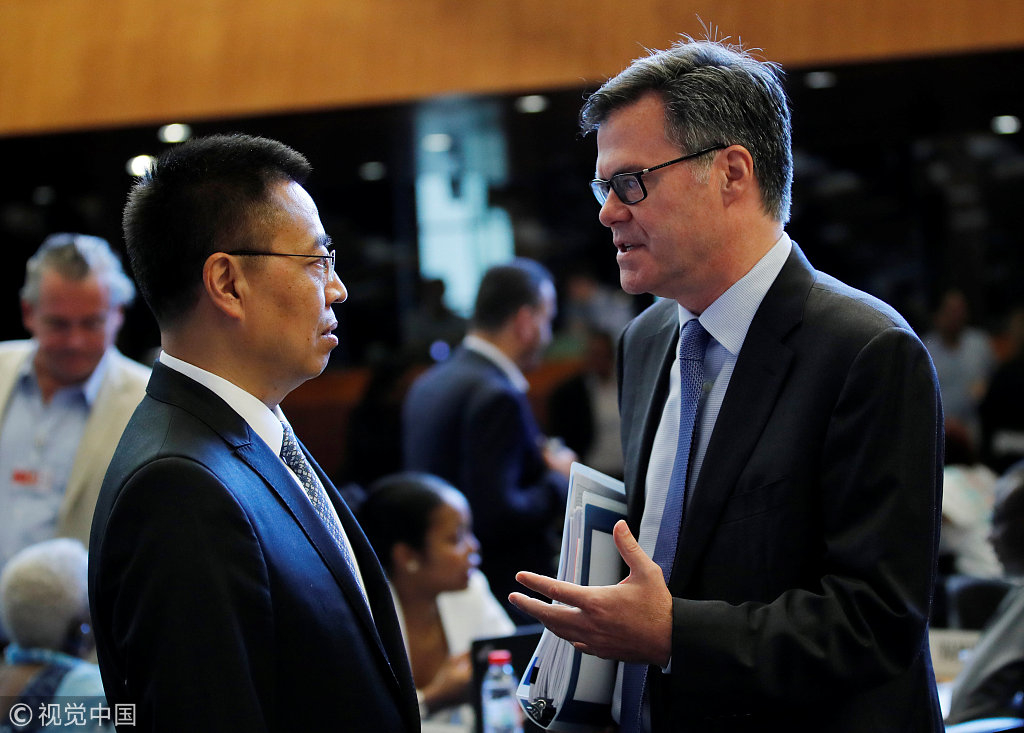
Opinion
08:28, 22-Mar-2019
The U.S. will of marginalizing WTO: Strong and true
Updated
19:55, 22-Mar-2019
Li Haidong

Editor's note: Li Haidong is a professor of the Institute of International Relations, China Foreign Affairs University. The article reflects the author's opinion, and not necessarily the views of CGTN.
Since its establishment in 1995, the World Trade Organization (WTO) has always been a key component of the global trade system. However, since Donald Trump came into power, the U.S. government has continuously threatened to withdraw from the WTO. Is this a diplomatic negotiation strategy or will the U.S. really withdraw from the WTO?
Taking a closer look at U.S. actions towards the WTO in recent years, we can see that the U.S. does complain about the multilateral trading system with the WTO at its core.
At present, the U.S. requirements for the reform of the global trade system are relatively clear: either the WTO undergoes fundamental reforms to conform with the "America First" policy or the WTO is completely discarded and replaced by a different global trade system based on many bilateral trade agreements with the U.S. at the center. In comparison, the latter can better reflect the U.S. policy priorities.
That means, although the U.S. has not given up its efforts to reform the WTO, its policy focus has been on establishing a new global trade system outside the WTO that is in line with its own interests.

U.S. President Donald Trump speaks to the press about the WTO aboard Air Force One in flight as he travels from Joint Base Andrews in Maryland, to Bedminster, New Jersey, June 29, 2018. /VCG Photo
U.S. President Donald Trump speaks to the press about the WTO aboard Air Force One in flight as he travels from Joint Base Andrews in Maryland, to Bedminster, New Jersey, June 29, 2018. /VCG Photo
First of all, the U.S. is strongly dissatisfied with the existing WTO system, which is inseparable from its long-running hegemonic attitude. The rapid rise of the economic power of developing countries, especially China, in the current trade system, invokes concerns over the U.S.'s dominant position in global affairs. For the U.S., China is a strategic rival. The U.S. is disturbed by the fact that China's economy is boosted by the WTO system and China is having a greater say in WTO reform issues.
The U.S. is trying to establish a global trade system that reflects its values and economic interests. But the existing WTO system is considered to be contrary to its goal. The U.S. needs a trading system that effectively delays or contains China's strong and fast-growing economy. However, the existing WTO framework cannot meet those requirements. If the WTO reform cannot do what it wants, the U.S. will strive to create a new global trade system.
Secondly, most member countries believe it's necessary to carry out reform as the decision-making and negotiation process of the WTO is undemocratic and opaque. Over the past 20 years, the achievements of internal self-reform have not been very desirable. Although efforts will be made to push forward proposals for reforming the WTO, the focus of U.S. policy has already been on the establishment of a new global trade system.
Thirdly, despite the generally good performance of the U.S. economy, the gap between the rich and the poor in the U.S. is widening. In the election season, in order to win the support of a large group of voters who are unemployed and underprivileged, U.S. politicians have directed their attention to fast-growing emerging economies such as China by accusing the latter of protectionism, dumping and subsidizing goods etc., while the WTO is considered to be supporting emerging economies and said to be responsible for causing various economic problems in the U.S.

Dennis Shea (R), U.S. Ambassador to the WTO, talks with Zhang Xiangchen, Chinese Ambassador to the WTO, before the General Council meeting at the WTO in Geneva, Switzerland, July 26, 2018. /VCG Photo
Dennis Shea (R), U.S. Ambassador to the WTO, talks with Zhang Xiangchen, Chinese Ambassador to the WTO, before the General Council meeting at the WTO in Geneva, Switzerland, July 26, 2018. /VCG Photo
The U.S. government has increasingly attributed the economic and social problems in the U.S. to the failure of the current global trade system represented by the WTO. It believes that the global trade system does not meet U.S. expectations and infringes on U.S. interests.
Finally, since taking office, the Trump administration has attached little importance to multilateral trade mechanisms such as the WTO, but focused on steadily advancing the establishment of a trading system with many bilateral trade agreements with the U.S. at the center. The U.S. has been happily negotiating bilateral free trade agreements with Japan, Canada, and many other Eurasian countries and has made some progress in that regard.
Generally speaking, the U.S. efforts to construct a trading system that reflects U.S. supremacy and interests will not cease in the future, which also means that the WTO will become increasingly marginalized in the new global trade system built by the U.S.
(In a few days, this year's Boao Forum for Asia will be held in south China's Hainan Province, with the WTO reform as one of the major topics. Stay tuned to CGTN for the latest insights.)
(If you want to contribute and have specific expertise, please contact us at opinions@cgtn.com.)

SITEMAP
Copyright © 2018 CGTN. Beijing ICP prepared NO.16065310-3
Copyright © 2018 CGTN. Beijing ICP prepared NO.16065310-3